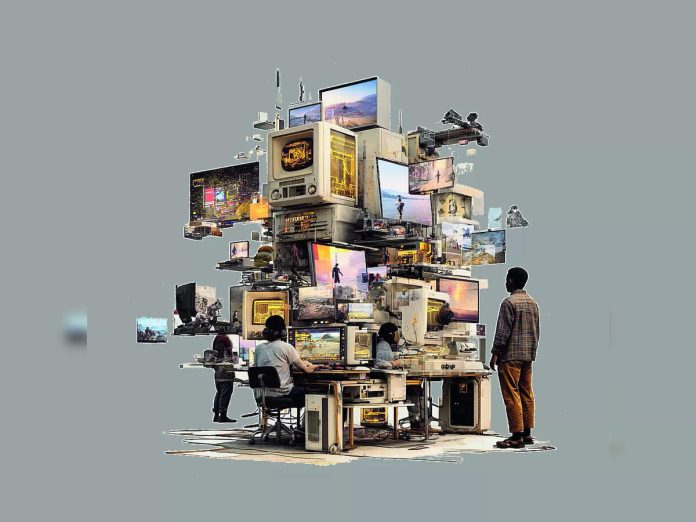As Indian gaming studios increasingly develop advanced intellectual properties with large budgets, strong visual design and complex gameplay mechanics, the demand for specialised talent is rising sharply. According to staffing firm TeamLease Digital, India’s gaming industry has 50,000-60,000 open positions across fresher and experienced roles.
Roles such as experienced gameplay engineers, backend developers, principal animators, 3D artists and environment designers are in demand, according to industry executives and studio founders.
The industry now employs around 130,000 people, compared with 50,000 in 2022.
“The Indian gaming industry is hiring a combination of technical and creative skill sets,” said TeamLease Digital chief executive Neeti Sharma.
Key roles in demand include game developers (especially with skills in Unity or Unreal platforms), backend engineers for multiplayer games, 3D artists, animators and game designers.
Bengaluru-based gaming startup LightFury Games, which has a team of around 80, is hiring for roles across animation, game art, backend infrastructure and gameplay engineering, said cofounder Anurag Banerjee.
“We need to hire another 30-40 people at least… What we look for is talent that we can nurture and train to that degree that they can now start building AAA titles,” Banerjee told ET.
In gaming parlance, an AAA rating refers to a classification given to big-budget, high-profile video games developed and published by major studios. It is not an official rating, but an industry term. AAA games often have tens or hundreds of millions of dollars in development budgets.
Last year, the studio raised $8.5 million from Blume Ventures, Mixi and Gemba Capital, with Cred founder Kunal Shah and Unacademy CEO Gaurav Munjal also participating in the funding. It recently unveiled its first title, E-Cricket, a big-budget ‘AAA’ game being developed in collaboration with Amazon Web Services (AWS), slated for launch in 2026.
Pune-based SuperGaming, currently expanding its team for its flagship Indus Battle Royale game, said while developers can earn through casual games like Teen Patti or Ludo, the challenge lies in finding talent motivated to build high-quality, technically complex titles.
“A good gaming studio takes 10 years to be successful and to make a video game great, you have to assemble 20 different kinds of teams including engineering, narrators, art, music, servers, marketing. It is a task of complex coordination, and you can do it only with experience,” said founder and CEO Roby John.
The company has hired over 25 professionals who previously worked at global studios like Ubisoft, indicating a trend of reverse brain drain, where experienced talent is returning to India to build homegrown IPs.
To address local talent gaps, SuperGaming has also tapped into global hiring. The company employs full-time international staffers through its Singapore-based entity, SuperGaming Pte Ltd, said John.
This approach contrasts with other studios that often rely on freelance talent to fill immediate needs.
LightFury, too, has focused on bringing back experienced Indian professionals who’ve worked on global AAA titles, and is also hiring internationally for some niche roles, said cofounder Tina Balachandran.
This shift is being driven by multiple forces including rising investor interest in gaming startups, the emergence of high-end mobile-first formats, and easier access to global development tools and cloud infrastructure.
Long road
Despite growing optimism, scaling a game studio remains a long and capital-intensive journey.
Hiring top-tier talent, especially professionals with experience in console or PC gaming, continues to be a major challenge.
Unlike casual games, building mid-core or AAA titles typically demands years of sustained investment before any meaningful returns are realised.
“A lot of the talent that (in India) is experienced in casual games, and in simulation-based games. Also, there’s product and live operations talent available for mobile games,” said Anuj Tandon, partner at Bitkraft Ventures. “But what’s largely missing from India is the experience in certain genres, game designers and very specific technical talent. There’s a lot of young, fresh talent, but the experience level is missing.”
AI’s growing role
At the same time, artificial intelligence is starting to play a key role in reducing development timelines and production costs. Studios are beginning to integrate AI tools to create smarter non-player characters (NPCs), generate realistic and dynamic game environments, personalise gameplay, enhance graphics and visual effects, and streamline overall development processes.
“If you’re not using AI, you’re living under a rock. It has impacted game development timelines and efficiency. Has it replaced people? Absolutely not. But it has made people more efficient, and studios are adopting it in smarter, more cost-effective ways,” said Tandon of Bitkraft Ventures. “Three to five years down the line, when AI is mainstream and we have a stronger talent pool and core skills, it’s going to be very transformative for emerging markets like India.”
However, studios caution that while AI enhances efficiency, the quality of a game still hinges on the creativity and collaboration of skilled developers.
According to Avichal Singh, cofounder of Nodding Heads Games, AI is just another tool in a developer’s toolkit and the core principles of what makes a great game remain unchanged.
“It can help you get there faster, or even help you check for your idea, whether it’s valid or not, faster. But beyond that, you will still need those skill sets, which are required to make video games,” he said.
